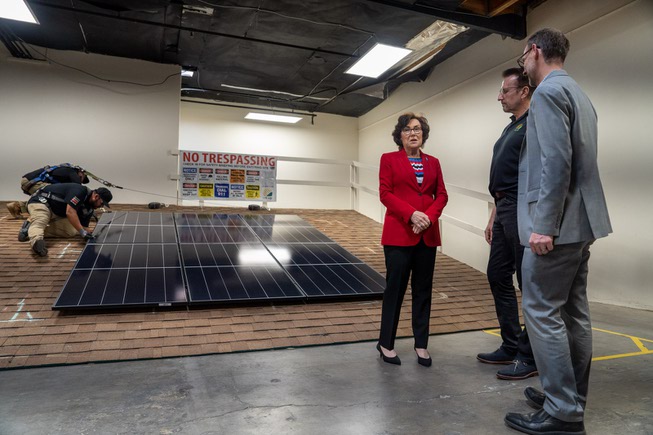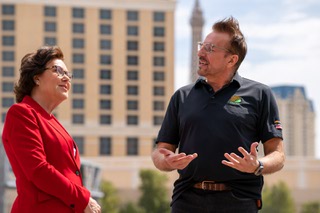
U.S. Senator Jacky Rosen, Clark County Commissioner Justin Jones, and leading public health, environmental justice, and climate advocates tour local solar business Sol-Up in Las Vegas, to tout the historic federal investments across the state of Nevada to cut greenhouse gas emissions and bolster the regions clean energy economy. Wednesday, April 12, 2023. Brian Ramos
Friday, April 14, 2023 | 2 a.m.
The way U.S. Sen. Jacky Rosen sees it, Las Vegas has the potential to be more than just the entertainment capital of the world.
Yes, Las Vegas attracts tens of millions of visitors each year with its dozens of luxury resorts, ample concerts and stage performances and nearly year-round sunny weather. But the Democratic lawmaker from Nevada would like to also focus on the latter.
“We can be the entertainment capital and the solar capital,” said Rosen, who on Wednesday toured the headquarters of Sol-Up, a Las Vegas-based solar panel retailer and installation company located off Dean Martin Drive. Nevada’s junior U.S. senator was there to tout federal investments in clean energy made possible through the Inflation Reduction Act.
Rosen and fellow Nevada U.S. Sen. Catherine Cortez Masto were key votes in helping the $738 billion spending bill clear the Senate along party lines before it was ultimately signed into law by President Joe Biden in August.
Federal officials estimate the Inflation Reduction Act will bring an estimated $2.7 billion in renewable energy generation and storage to the state by 2030. That’s especially good news for homeowners looking to outfit their homes with solar panels, who with the new law are eligible for a tax credit worth up to 30% of installation costs.
More than 75,000 Nevadans are expected to install rooftop solar panels in the next five years, Rosen said, adding that transitioning to solar can reduce one’s carbon footprint, cut a user’s monthly energy bill and stimulate growth for the budding industry.
Given the average pricein Nevada to purchase and install a solar system — about $31,000 according to Forbes, the cost of akilowatt-hour over the expected 25-year lifespan of the panels would come out to about 13.5 cents. Meanwhile, the standard electric rate for Southern Nevada residents currently sits at 14.44 cents per kWh, according to NV Energy.
“These investments will create good-paying jobs, help lower energy costs for families, and help tackle the climate crisis,” Rosen said. “It’s a win-win-win.”
Nevada had approximately 32,378 workers in the clean energy sector, according to Environmental Entrepreneurs, a nonpartisan group that advocates for policies that benefit the environment and economy. That figure is expected to at least double over the next decade, according to the Political Economy Research Institute at the University of Massachusetts Amherst.
Frank Rieger, chief executive of Sol-Up said within the seven years of the company’s existence, it had grown from just a handful of employees to more than 130 today and more on the way.
“As a local solar business, we see firsthand the positive impact these federal investments have on our industry,” Rieger said. “The support from Senator Rosen and the Biden administration help us create jobs and expand the solar market in Nevada, benefiting both our economy and environment.”
In addition to solar panels, tax credits are available to cover up to 30% of the cost for some home energy efficiency improvements. Among them: Up to $1,200 in credits for adding insulation or installing energy efficient doors and windows, and as much as $2,000 for electric heat pumps.Families can claim a credit of up to $150 for a “home energy audit” conducted by an inspector.
Qualifying low- and moderate-income households can get rebates covering the entire cost of installing appliances like electric water heaters and clothes dryers.
To learn more about tax credits, visit www.whitehouse.gov/cleanenergy.

